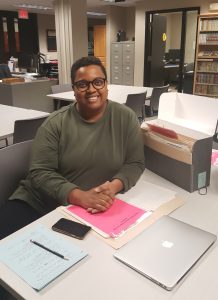Taryn D. Jordan was researching Ella Fitzgerald at the Schlesinger Library in the Radcliffe Institute when she first encountered the papers that would bring her to the Iowa Women’s Archives. Jordan is a doctoral candidate in Women’s, Gender & Sexuality Studies at Emory University and an ACLS Mellon Dissertation Completion fellow who has been researching in the papers of Aldeen Davis this December.
Her dissertation, A Peculiar Sense: Feminist Genealogy of Soul is drawn from her interest in the domestic work black women did in their homes and how this created “soul,” which Jordan defines as “black collective feeling.” Soul provided a space of respite from racism and anti-blackness and helped to articulate a philosophy of endurance within black communities.
Jordan’s dissertation initially only touched on the concept of soul broadly, but after receiving an e-mail from a friend of friend she was inspired to dig deeper. The Ella Fitzgerald papers at the Schlesinger Library contained a number of cookbooks, the friend said, that complemented Jordan’s work. Although her prospectus was complete, Jordan arranged for a trip to Massachusetts to see these books and the three folders donated with them. Within one of these folders was a draft of ‘Miss Aldeen’s cookbook,’ by Muscatine, Iowa woman, Aldeen Davis. It captivated Jordan because unlike so many of the other cookbooks about black cooking that she had encountered, it treated cooking as more about feel than measurements, something that came from the soul. Jordan tracked down a published copy of the book, now titled Soul Food for Thought, at the University of Alabama but discovered that it had radically changed from the draft in Ella Fitzgerald’s papers that had been so captivating. Why were the books so different? This was the question that drove Jordan to the IWA and the Aldeen Davis papers.
Aldeen Davis, the author of Soul Food for Thought was a writer and community activist who moved to Muscatine, Iowa in the 1940s. She became thoroughly involved in Muscatine and its black community, serving on the Muscatine Human Rights Committee and the Equity Committee of the school board, and published articles in The Iowa Bystander, an African American owned newspaper. Her book was based on her long running column “Soul Food and Thought,” that combined recipes with African American history and descriptions of daily life.
In the late 1990s, Davis donated scrapbooks of her columns along with personal papers that recorded her community involvement in numerous causes and women’s clubs to the Iowa Women’s Archives. In these papers, Jordan found the answer to the question that had brought her to Iowa. The published book substantially changed from its draft, but not because Davis had changed her mind about it. In fact, she had written the draft in response to a soul food cookbook that she didn’t like because it was too precise. But the publishing world wouldn’t print a cookbook that measured by feel. Davis was forced to re-write. Soul, Food for Thought was published in 1984.
After spending a week immersed in Davis’ papers, it’s an open question how much of this will find a place in Jordan’s final dissertation. But she says the trip to Iowa has been worth it, to get to know Aldeen and her work. It’s “like she found me,” Jordan said, “I feel like we’re talking to each other across time.”
